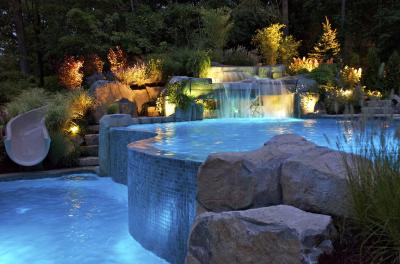Bergen County NJ- If the pool company you hire to build your vanishing edge or perimeter overflow swimming pool doesn’t have the expertise, the pool will fail!
Bergen County NJ- If the pool company you hire to build your vanishing edge or perimeter overflow swimming pool doesn’thave the expertise, the pool will fail!
Vanishing edge swimming pools, also know as “zero edge” or “infinity edge” pools, as well as perimeter overflow pools and spas, project the illusion that water housed in ones swimming pool is eternally pouring over the edge, and into the horizon beyond. While of course this is simply an illusion and the water is actually being collected and recirculated, vanishing edge swimming pools & spas create an irrefutable “wow factor” that is sure to astound family and friends alike.
While such swimming pools truly do live up to the hype, if you are interested in purchasing one, it is vital that the company you hire to construct your pool, have experience and expertise specifically pertaining to vanishing edge pools. If they don’t, you are gambling with your investment, as well as the longevity of your specialty pool.
If the company that you hire to construct your vanishing edge or perimeter overflow pool does not have expertise in building, these are just a few of the many things that are likely to happen:
Calcium Deposits. On the “weir” wall, the wall in which the water “flows over,” water can literally enter into the pores of the plaster or tile joints and wreak havoc along the way. Simply put, the water takes minerals from surrounding concrete and drags them through the concrete pores along with it. This stems from improper construction and results in visible and ugly white stains which can very easily lead to large cracks or delamination in the plaster or tile, and in the most severe cases the gunite structure. Applying certain sealers during construction will protect the structure from water migrating through the weir wall causing calcium deposits and other types of significant damage.
Gunite Rebound: Gunite is a mixture of sand, cement and water, and is a material that is both flexible, and incredibly durable. When applying the Gunite during the construction of the pool, excess Gunite commonly “rebounds,” and collects in pockets. If the rebound is not removed properly before the Gunite spraying continues commonly called “flashing”, it can result in trapped pockets of air or non-structural masses that significantly weaken the overall structure of the pool which can lead to cracks and or structural failure. Rebound should never be flashed over and should always be removed during the gunite application. This is especially critical in the construction of vanishing edge pools.
“Rolling” While one inch of settling in a standard pool is known to be within the “industry standard,” (by no means do we agree with this!) the pool may still function, if a vanishing edge or perimeter overflow pool moves or settles even a quarter of an inch, it’s considered a catastrophic failure. Rolling occurs when static pressure from the backside (opposite the vanishing edge side) of the pool pushes the pool forward. Once this occurs, water will no longer flow evenly over the weir wall, and will instead flow to one side exposing the tile wall on the other side. Extending the structure ads additional support to the outer portion of the swimming pool, and will help prevent rolling from occurring.
Bonus: Just when you thought you were done, Mother Nature strikes again. Here is a post construction tip for vanishing edge and perimeter overflow pools & spas, that need to be winterized.
Winter Covers: In the Northeast, once the pools are closed and the winter cover is put on people tend to forget about their pools until the summer months return. On a vanishing edge pool however, the winter cover can cause a tremendous amount of damage. Snow loads and freezing and thawing cycles all cause friction to occur on the top of the tiled weir wall. The grout joints then turn weak, and often crack off. Once this occurs water migrates behind the tile, and as the freezing and thawing cycles continue through the winter, tiles begin to loose the bond to the wall and fall off. We suggest using a unique non-porous foam padding on top of the weir wall, under the winter cover. The rigid padding reduces friction and thus protects the tile.
Longevity Issues: You are investing a significant amount of money into your pool, and you deserve to have that pool last for years, and generations to come. If your pool is not built by en experienced company however, it will undeniably fall apart, further requiring exorbitant amounts of money to fix it suitably.
Vanishing edge pools in particular are an incredible luxury as well as a significant investment, and they are guaranteed to amaze your friends and family. Be sure to thoroughly research the company that is going to build your pool. Don’t rely on pictures. Go visit previous pools constructed by the company, and if possible talk to the people who utilize them. As long you do your research properly, you will ultimately safeguard your investment.
For more information on this site for landscape architecture
For more information on this site for inground pools
For more information on vanishing edge or perimeter overflow pool failures and how to protect yourself please contact Christie@plantnj.com or call us at 201-785-0800 and ask for Chris, Keith or Bill.









